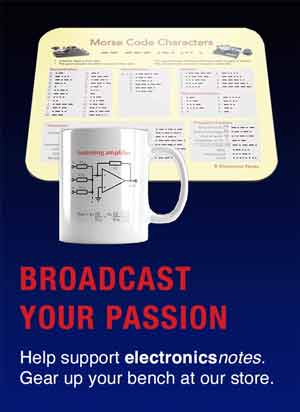Phase Shift Sine Wave Oscillator / Generator
The Op amp Phase Shift sine wave oscillator or generator is an excellent circuit for generating a sine wave signal at audio frequencies and above.
Op-amp Circuits Include:
Introduction
Circuits summary
Circuit design hints & tips
Inverting amplifier
Summing amplifier
Non-inverting amplifier
Inverting vs non-inverting circuits
Variable gain amplifier
High pass active filter
Low pass active filter
Bandpass filter
Notch filter
Comparator
Schmitt trigger
Multivibrator
Bistable
Integrator
Differentiator
Wien bridge oscillator
Phase shift oscillator
 Check out my Op-Amp eBook. Check out my Op-Amp eBook. |
The phase shift oscillator is a format that has a number of advantages over the Wien bridge oscillator. In particular the levels of distortion are normally lower and the frequency stability is also good, provided the components used are sufficiently stable themselves.
The oscillator is formed around the basic phase shift network which consists of three RC sections which provide a steep change in phase with frequency.
The simplest circuit consists of an operational amplifier, three capacitors and four resistors.

Calculating the frequency of oscillation from first principles is complex because each of the stages of the phase shift network loads is neighbour. However the calculations can be simplified to provide a couple of easy formulae to use.
The phase shift network resistors should all be set to the same value as should the capacitors, i.e. R1=R2=R3=R, and C1=C2=C3=C. In this case the values can be determined from the formulae given below.
 Written by Ian Poole .
Written by Ian Poole .
Experienced electronics engineer and author.
Essential operational amplifier data:-
Make your op-amp selection with op-amp data as well as distributor price and availability.
Check it out now!
More Circuits & Circuit Design:
Op Amp basics
Op Amp circuits
Power supply circuits
Transistor design
Transistor Darlington
Transistor circuits
FET circuits
Circuit symbols
Return to Circuit Design menu . . .



